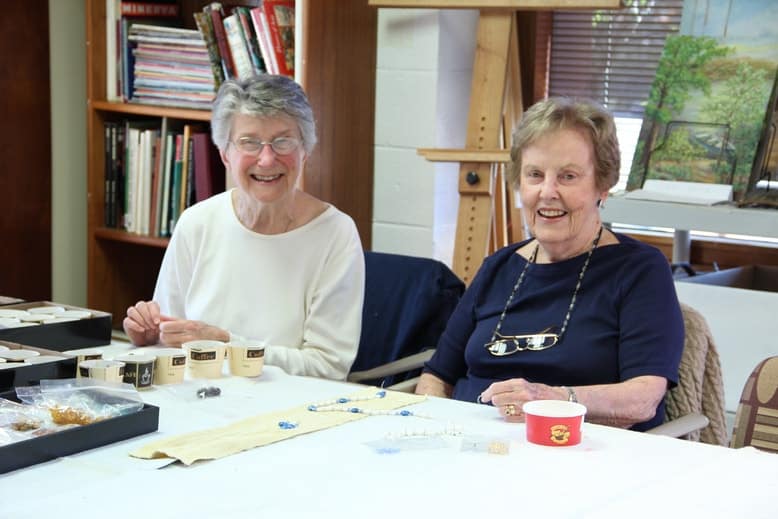How to Emotionally Support a Loved One with Alzheimer’s

Of all the medical conditions we humans potentially face, perhaps one of the most frightening is Alzheimer’s disease. Today, 5.3 million Americans are living with Alzheimer’s, and it’s estimated that nearly 500,000 new cases will continue to be diagnosed annually.
If you have a loved one with Alzheimer’s, one of the best ways to show your love is by demonstrating your emotional support and love in ways that resonate with someone dealing with the disease’s devastating effects.
Loved ones with Alzheimer’s in its early stages may be quite capable of remaining independent, with spouses and other caregivers providing minimal assistance. At some point, a move to assisted living to get extra help may be advisable. And in the later stages of the disease, a move to specialized memory care will likely be necessary. This is a point when it becomes imperative to provide a safe, structured—yet still mentally and physically stimulating—environment overseen by a specially trained staff.
Needing these higher levels of care is not a failing on your part. Only you and your loved one’s medical team know what’s best. In fact, having the support of professional caregivers frees you to do what you do best – be a loving spouse, relative, or friend to a loved one in need when it really means the most.
Regardless of what stage of Alzheimer’s disease your loved one is facing, your emotional support is essential. Even when your loved one can no longer express thanks, they’ll feel the love and care you give them.
The emotional effects of Alzheimer’s are powerful both for the person diagnosed and for those closest to them. But every stage of the disease also presents an opportunity for all involved to live and love in the moment together.
Here are some of the ways you can emotionally support a loved one with Alzheimer’s disease:
- Gain knowledge and understanding of the stages and how the disease will affect your loved one. Alzheimer’s, the most common form of dementia, is a progressive disease. While there are individualized responses, medical experts have categorized 7 clinical stages that you should know and prepare for. Each stage has a progressive effect on cognitive and memory function, physical function, behaviors, and moods.
- Adjust your communication accordingly. Early on, laughing together about memory mistakes can help lighten the moments and bring you closer together – take care that the humor is not at your loved one’s expense. Also try not to remind them that they just asked the same question. Instead, simply ignore it and redirect to another topic or activity you know they enjoy, like singing or reminiscing.
- Take care not to let your loved one become invisible. People with Alzheimer’s will begin having trouble “keeping up” with group conversation and may withdraw as the disease progresses. Find ways to include them in the conversation, even if you must simplify your questions or explain the conversation in simpler terms for them. Feeling included will help them maintain their sense of identity and know they’re still valued as a person.
- Remember your loved one’s angry words are not a personal attack. We’re only human and that can make it tough to hear a loved one show disdain toward you or swear at you. It’s not personal— losing your “self” is frustrating and frightening. You can help by remaining calm and patient with your loved one during these times. Use reassuring “nonverbal communication” like a pat on the arm and a smile. Then change the subject, and even the location, if you can. Grab a cup of coffee together or take a walk in the sunshine.
- Focus on increasing “yes” or “no” conversations. This isn’t about treating your loved one with Alzheimer’s like a child; it’s just about keeping your questions simple. Inquiries needing just a “yes” or “no” work best—and try to ask just one question at a time. Instead of asking an open-ended question, like “What would you like to drink?” ask “Would you like soda or lemonade?” Visualize cues such as pointing to a food image on a menu can be very helpful for someone with memory loss, and will allow you to guide a response, e.g. “The lemonade looks really refreshing…that might be a great choice!”
- Encourage family and friends to continue to engage. One common side effect of your loved one’s illness is that visits from family and friends begin to dwindle. Many people are uncomfortable around anyone with Alzheimer’s, afraid they’ll say or do something wrong. Help relieve their discomfort by reaching out to set up visits and then being there as an icebreaker. Human contact through voice or touch is very beneficial for people with Alzheimer’s.
We’re Here to Support Loved Ones and Their Families.
Watching your loved one go through the stages of Alzheimer’s disease can be overwhelming. Support for your emotional and physical needs is equally important. When the time is right to explore professional assistance, we hope you’ll consider Meadow Lakes.
Our memory care neighborhood is safe, secure, and supportive for your loved one. Plus, as your loved one’s disease progresses, we’ll be there to provide much-needed support for your emotional needs and concerns as well. Browse the details about our Memory Care services and then let’s talk. We’re here to help.




